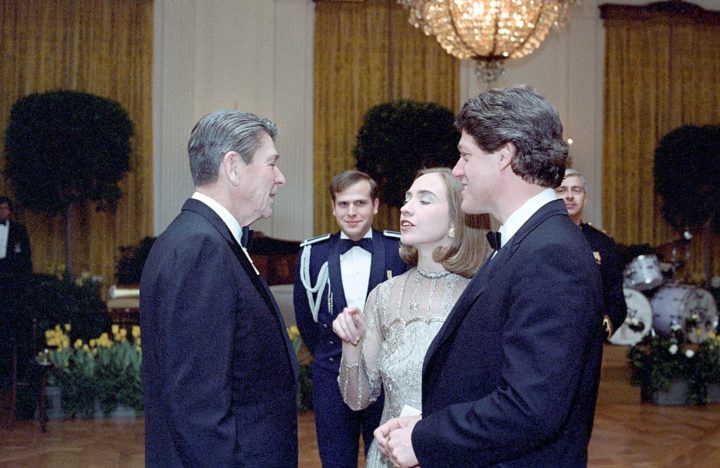Many people feel confused by the word “neoliberal”. It’s understandable that they’re confused. The term “neoliberal” is an odd and confusing piece of language that is very often conflated with the term “liberal”. They are not the same thing.
In the United States, the terms “liberal” and “left” are quite often used synonymously. Since the mid 1930s, generally speaking, the liberal left have been proponents of the social-economic values and policies that flowered out of The New Deal under FDR. Things like equal opportunity, social safety nets, public education, social security, etc., have all been core concerns for US liberals, arguably up until very recently. This definition of liberalism differs quite a bit from what it means to be a liberal in England.
Although the roots of classical liberalism date back to the late 18th century the term’s definition differs depending on where and by whom it’s being used. For instance, in England the meaning of the word “liberal” is very similar to what it was two hundred years ago. Economic liberalism in England means that the economy is best left alone and that social and political concerns should be kept at a distance from the supposedly self-corrective mechanisms of the “free market”. The French term “laissez-faire”, which means to let it be, is the central tenet of classical economic liberalism. This is pretty much the opposite of what liberalism has come to mean in the US.
In the late 1970s in England and in the early 1980s in the US, there was a resurgence of the English version of economic liberalism. This resurgence manifested in the administrations of Margaret Thatcher in England and Ronald Reagan in the US. A central feature of the form this ideology took was to demonize the “liberal left” institutions that lifted the US out of social and economic despair forty years earlier. Things like labor unions, social safety nets and taxation of the wealthy were all put on the chopping block. In their place came the privatization of public institutions, the deregulation of markets and a shifting of the burden of taxation away from the very wealthy squarely onto the shoulders of the middle class and the poor. This shift in policy, which was initially pushed forward by conservative Republicans in the US, was later coined “neoliberalism”.
To add to this confusion of terms and factions, in the early/mid 1990s the Democratic Party in the US began discarding its liberal left-of-center ideology and started adopting the policies of “neoliberalism”. In fact, many consider the Clinton era (1992 – 2000) to be the steroid era for neoliberalism. Under the direction of Alan Greenspan, who was also the main economic advisor to both Nixon and Reagan, the Clinton administration all but did away with restrictions on corporate monopolies in the areas of international trade, the media, the prison system and the banking system. The last two decades of the twentieth century, the Reagan-Clinton era, basically amounted to a neoliberal coup.
By the year 2000 the liberal left of center governmental policies of the US Democratic Party had been largely abandoned in favor of neoliberal policies. Since that time we have endured two major economic collapses (in late 2000 and in early 2008) and a near complete takeover of all major US institutions by corporate monopolies during the Bush, Obama and Trump years. As for President elect Joe Biden, his core positions and proposals are in lock-step with pretty much all of his six neoliberal predecessors.
In fact, with the exception of less than a handful of outliers, EVERY current US politician in the upper tiers of government is more or less a proponent of the neoliberal ideology. What we have witnessed in the 21st century so far is the triumph of neoliberalism and the fall of the US liberal left.
The result of all of this activity has been what essentially amounts to an unspoken unification of the Republican and Democratic parties’ basic ideologies when it comes to economic and, consequently, military policies. The mainstream news media, who due to neoliberal deregulation have become spokespeople for their multi-billionaire corporate employers, never speak of this fusing of ideologies. Instead the largest cable news networks like MSNBC, Fox News and CNN all play the game of focusing the public away from the economic and military collusion of the mainstream Democrat and Republican parties.
These corporate politicians and media servants of super-wealth have thoroughly confused the public by directing their attention toward peripheral differences and sensationalism with the aim of constantly stoking resentment between the “left” and the “right”. This propagation of confusion has, up until now, maintained the division between the increasingly marginalized masses of the supposed “left” and “right”.
It will be interesting to see what transpires when this divisive corporately driven ruse is ultimately seen through by an increasingly disenfranchised general public. It will be fascinating to be a part of what happens when the phantasmal line between the forsaken “left” and the forsaken “right” finally dissolves, and we unite in a common struggle to save our shared destiny.










